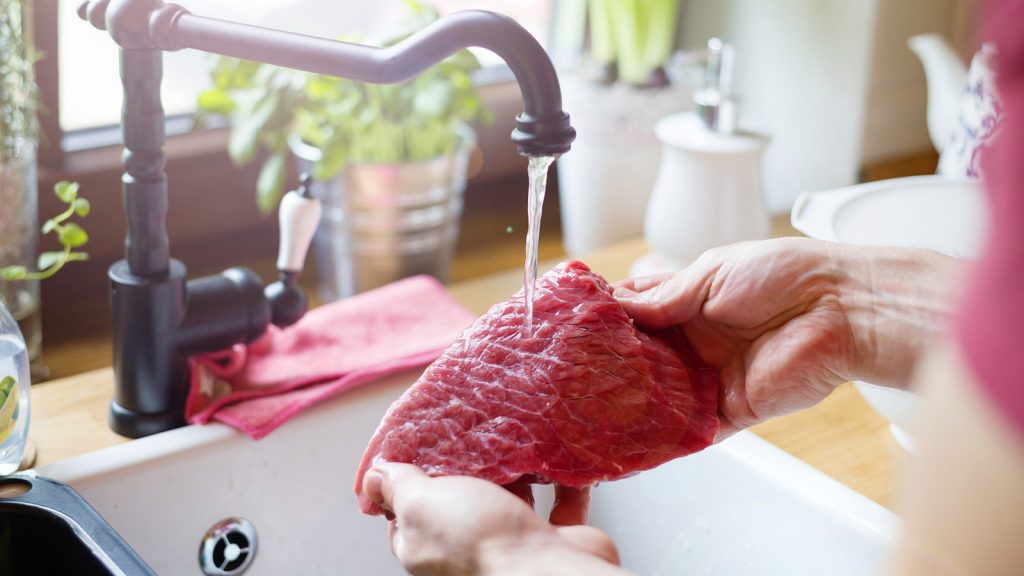Have you ever wondered whether you should be rinsing your meat before cooking or freezing it and whether is it safe to do so?
These little debates can stir up quite the commotion and often depend on what you prefer. Due to the fact that raw meat, poultry, and fish may be contaminated with harmful bacteria and viruses that lead to food poisoning, many people argue that a quick rinse under cold water can wash away surface dirt or debris, making the meat cleaner and safer to eat.
The rationale behind this practice is simple: washing the meat can help remove any potential bacteria or contaminants, right? Well, not exactly.
Should you wash your meats before cooking and freezing?
After speaking to dietician and nutritionist, Robyn-Leigh Mentor, it can be understood that washing meat may pose additional food safety and health risks by spreading bacteria to other surfaces and foods that will be eaten raw, such as fruit or salad.
“Generally, it is not necessary to wash meat before cooking or freezing. Most stores where meats are purchased should have a food safety system in place called Hazard Analysis and Critical Control Points (HACCP). It is a structured method for ensuring food safety by identifying, assessing, and managing risks at every stage of food production, globally acknowledged for its effectiveness in preventing foodborne illnesses. What is important is ensuring that we store meats and cook meats at the correct temperature in order to reduce bacteria without pre-rinsing,” says Robyn-Leigh.
More so, consumers need to note that there are many potential risks associated with washing meat. When you rinse raw meat, you risk splashing bacteria-laden water around your kitchen, countertops, and utensils.
Touching on the risks at hand, Robyn-Leigh explains that washing meat before cooking does not improve food safety and can increase the risk of foodborne illness due to cross-contamination.
ALSO READ: The benefits of consuming meat fat
Washing meats can contribute to cross-contamination. Cross-contamination involves the movement of microorganisms from one raw item to another surface, kitchenware, hand, clothing, or other foods.
“To reduce bacteria on meat surfaces we need to consider where we are placing our meat, in most cases is it chopping boards. Using separate boards for different food types such as meat, poultry, and fish can be effective in reducing cross-contamination. Most homeware stores sell affordable colour-coded chopping boards for easy identification which in turn reduces cross-contamination and foodborne illnesses,” Robyn-Leigh adds.
Does washing meat affect its nutritional content?
Some people soak the meat in salty water before cooking it, but this does not affect food safety. Cooking meat and poultry at a high temperature is enough to kill all bacteria and people should aim to cook meats to an internal temperature of at least 60-62°C.
Another pressing question is whether or not meat loses some of its nutritional value after it has been rinsed or soaked before cooking. The short answer is no.
The primary nutrients in meat, such as protein, fats, vitamins, and minerals, are not water-soluble and therefore not easily lost through rinsing. However, prolonged soaking or washing in water could potentially lead to a minor loss of water-soluble vitamins like vitamin B and some minerals. Yet, this loss would be minimal and likely negligible in the context of a balanced diet.
“Washing meat removes its natural protective layer and there might be a slight loss of some vitamins however, washing meat does not significantly affect its nutritional content. More often when meat is washed, it removes the natural juices causing it to appear dry and less juicy. It’s important to focus on safe cooking practices and handling meat properly to maintain its nutritional value,” explains Robyn-Leigh.
ALSO SEE: Marinade meat using cola – here’s how to do it
Feature image: Pexels

